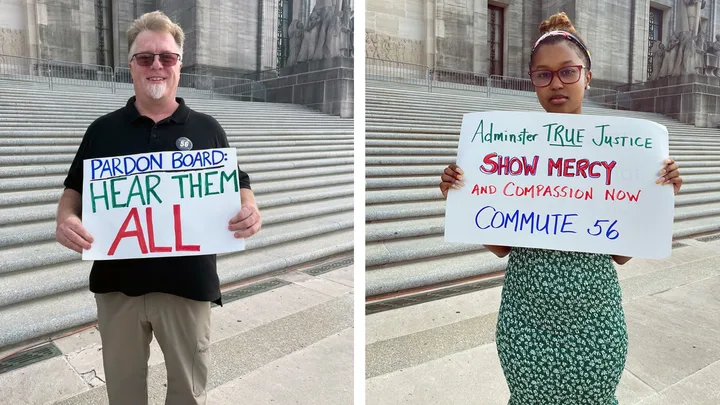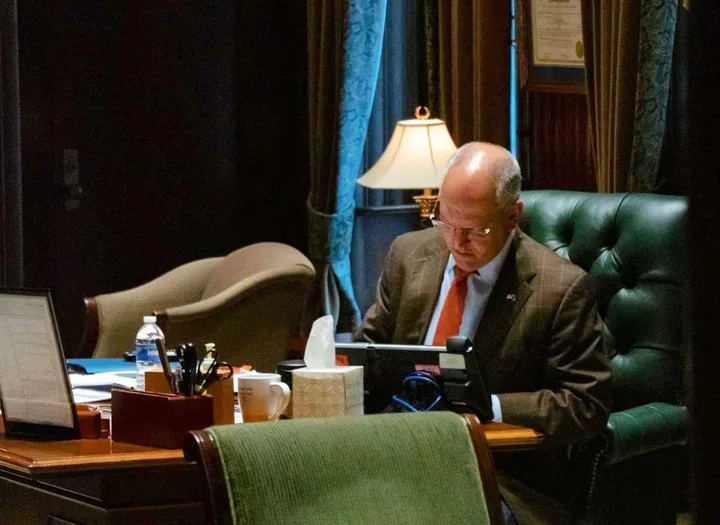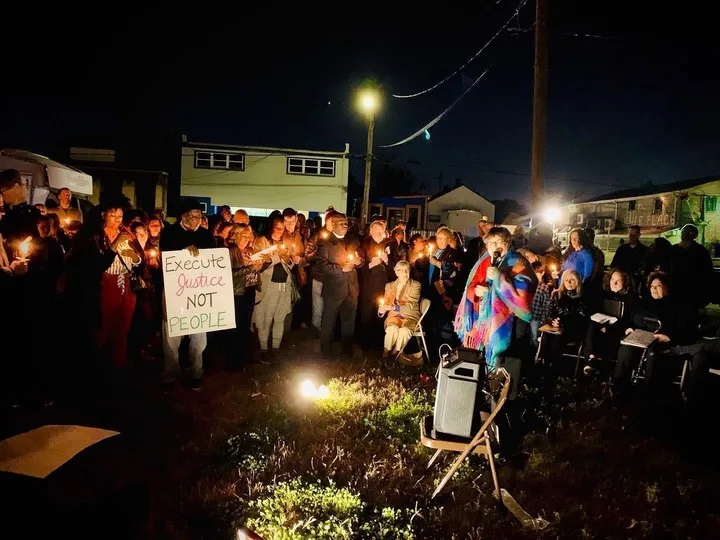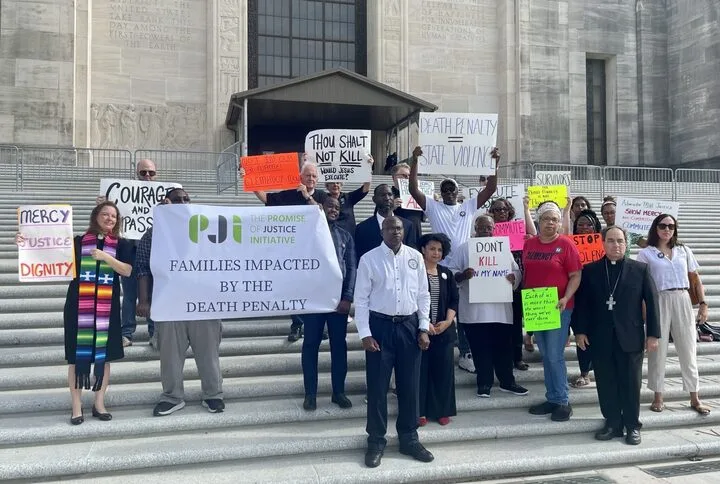BATON ROUGE, La. — For the first time, Louisiana is on the precipice of emptying death row.
Democratic Gov. John Bel Edwards is using his clemency power to help advance a mass request for commutations after he publicly called on state lawmakers to stop the death penalty months ago.
But time is running out. The governor leaves office in January.
WATCH: Why dozens of men spent most of their lives in prison after Louisiana reneged on plea deal
Emboldened by Edwards’ comments on capital punishment, all but one of the state’s 57 people on death row asked the governor in June to spare their lives by commuting their sentences to life without parole.
However, the state’s attorney general and others say the dozens of people on death row aren’t eligible to be considered for clemency.
Anti-death penalty advocates gathered on the steps of the Louisiana Capitol in August after the governor spoke out against the death penalty. They held bright neon signs that read, “The death penalty is not pro-life,” and “Commute the 56” as efforts to empty Louisiana’s Death Row gained momentum.

Brett Malone, on the left, holds a sign that reads, “Hear them all” at the Louisiana Capitol in support of the pardon board hearing of all 56 clemency requests from people on the state’s death row. Brenita Softly, on the right, is an attorney who represents the men on death row. She holds a sign that asks for “True Justice” and “Commute 56” during the rally. Photos courtesy of The Promise of Justice Initiative
Shareef Cousin, who was convicted of murder in New Orleans in 1996, joined the dozens of death penalty opponents and community activists who want to eliminate the practice due to the cost of executions, racial disparities in the criminal justice system, and religious beliefs. He told the crowd he was “a representation of a flawed system.”
At age 17, Cousin became one of the youngest people in the nation sentenced to death row.
“I’m not the first person to have been freed from Louisiana’s death row [for a wrongful conviction], and I’m sure I won’t be the last,” Cousin told the crowd. “When a lot of us were going to our high school proms or worrying about our bed not being made, unfortunately, I was worrying about whether or not my life would be taken for a crime I did not commit.”
Cousin served several years on death row before his conviction was reversed. The Louisiana Supreme Court ruled prosecutors mishandled his case.
“I’m not the first person to have been freed from Louisiana’s death row [for a wrongful conviction], and I’m sure I won’t be the last,” Cousin said.
Twenty-two people sentenced to death in Louisiana had their sentences reduced or were exonerated between 2010 and 2020, according to the corrections department.
What’s behind the effort to empty death row

Louisiana Gov. John Bel Edwards puts the finishing touches on his last State of the State address in April. Several days later, he publicly called for an end to Louisiana’s death penalty before lawmakers. Photo courtesy of the governor’s office
In his State of the State speech, Edwards opened the door for the historic, mass clemency requests when he called on the legislature to abolish the death penalty.
“Our criminal justice system is far from perfect,” the governor told lawmakers in April. “It doesn’t deter crime; it isn’t necessary for public safety; and more importantly, it is wholly inconsistent with Louisiana’s pro-life values, as it quite literally promotes a culture of death.”
Under state law, the governor has the ability to grant clemency in capital cases after a recommendation from the Louisiana Board of Pardons and Committee on Parole.
Following the rally, criminal justice advocacy group, Promise for Justice Initiative delivered a petition with more than 2,000 signatures to the governor’s office, asking him to keep his word.
Brett Malone helped deliver the petition. He doesn’t want the man convicted of his mom’s murder to die. “What’s wrong with letting him live?” he asked at the Aug. 15 rally. For years, he’s been calling on Louisiana politicians to “extend their pro-life values to the people on death row.”
“We just can’t see at this point how executing someone is going to bring any kind of closure or any kind of healing from the experience that we’ve had,” Malone told the crowd. “Do we return a bad deed with another bad deed or do we try a different tack?”
The Louisiana District Attorneys Association (LDAA) said the possibility that those convicted of serious crimes would get clemency is disturbing to families who have a multitude of concerns and are now suddenly thrust into the middle of this process. The LDAA is a professional association that represents all 42 statewide elected district attorneys.
“They have absolutely been gut-punched and now they are having to address and relive the most tragic events in the modern history of their families. I am disappointed,” said executive director Loren Lampert. “Some of them are hanging onto the promise that this person will suffer the ultimate favor for what they did to a loved one. Some of them candidly are afraid that if this person is not executed that they will eventually get out and then seek retribution against them.”
Death penalty opponents, like Cousin, believe it’s “a once-in-a-lifetime opportunity to right historic wrongs.”
Cecelia Kappel is an attorney for the Capital Appeals Project, which filed clemency petitions on behalf of most of the people on Louisiana’s death row. Looking at the cases collectively, she said, “makes it clear that the system is fundamentally broken.”
“It’s an indictment on the system,” Kappel said, “I would want to see the death penalty in Louisiana be on trial, as opposed to our individual clients and their individual circumstances.”
The Supreme Court reinstated the death penalty federally in 1976. Since then, Louisiana has carried out 28 executions with the last lethal injection held in 2010.
Twenty-seven states have the death penalty, and 18 inmates were executed last year across the country, according to the Death Penalty Information Center.
A shift in the state’s stance in a ‘pro-life’ state
There have been numerous efforts over the years to eliminate the death penalty in Louisiana. For the fifth time in six years, Louisiana lawmakers blocked attempts in May to abolish the state’s death penalty despite the governor’s plea.
Recent polls echo the divide on the issue — about half of Louisianans support the death penalty — but hint that a shift is possible in the state’s stance on capital punishment. Support for capital punishment in the state fell by seven percentage points in the last four years, dropping from 58 percent of residents in 2018 to 51 in 2022, according to a survey by Louisiana State University. During that same time, opposition to the practice saw a modest increase from 34 to 38 percent.
The state’s pardon board initially rejected all 56 petitions for clemency in July, saying none were currently eligible. The decision was based on an opinion from Landry’s office, though critics say it isn’t legally binding.
The attorney general said the clemency requests do not meet a key procedural hurdle and cited pardon board procedures, which do not allow members to consider clemency requests more than a year after a convicted defendant has exhausted their appeals in court.
“I oppose clemency for all of these offenders who were given valid death sentences by juries of their peers. My office will formally oppose their applications,” said Landry, who is running in the state’s gubernatorial race. “The death penalty is a contract our state made with crime victim families. They deserve justice!”
Weeks later, Edwards directed the board, which he appoints, to move forward with hearing the requests. “The rule, as written, simply does not prevent the Board’s consideration of these applications at this time,” he wrote in a letter. The board soon after reversed its decision.
READ MORE: Louisiana youths held in an old death row building suffer heat, isolation, advocates say
“Beyond moral justifications, there are a number of reasons, whether based in law or science, that support the need for mercy while considering these applications,” Edwards wrote. “I believe we must consider further the imperfect nature of the criminal justice system and the actual innocence that has been proven far too often after imposition of the death penalty.”
Defense attorneys have also weighed in. More than 250 attorneys wrote a letter to the board, saying, “Louisiana’s death penalty is too flawed to be carried out as it currently exists,” and they contend that Landry’s office has too many conflicts to be advising the pardon board on the matter.
LDAA quickly condemned the move to schedule the hearings and disagreed with Edwards’ interpretation of pardon board policy under state law. Lampert accused the governor of “putting his finger on the scale.”

Death penalty opponents hold a “Vigil for Life” on Jan. 7, 2020, to mark the 10th anniversary of the last execution of a person in the state. Speakers included Sister Helen Prejean, a New Orleans resident and anti-death penalty advocate. Photo courtesy of The Promise of Justice Initiative
“Candidly, it is not a referendum on the death penalty. [Y]ou don’t have to be for the death penalty to be opposed to what’s going on today,” he said. “Collectively, are we as a society willing to stand for a complete disregard of properly promulgated rules and laws in favor of advancing a political agenda or a moral agenda or a spiritual agenda?”
Lampert said if the clemency hearings move forward, they should do so “only after we have a full rule-compliant investigation and hearing that everybody can have confidence in.”
With the support of the Louisiana Sheriff’s Association, prosecutors plan to block the mass pardons. LDAA is “exploring every available avenue to prevent this from happening” and to halt the pardon board from “rushing” to conduct clemency hearings for people sitting on death row, Lambert said.
He also clarified that prosecutors’ opposition to the mass clemency requests has nothing to do with the “pro-life” values of the state.
“I respect their right to have that opinion, but it is disingenuous at best for you to compare a baby as pure as the driven snow who’s never done anything wrong with the circumstances in which these crimes were committed, the most horrible murders in Louisiana’s history,” Lampert said. “The debate is about our citizens. And, more importantly, our victims are entitled to rely on us playing by the rules. The clemency hearings are coming about in a way that is not compliant with the law or the rules.”
Race and the death penalty
The racial disparities in Louisiana’s use of the death penalty are stark.
There are 56 men and one woman on Louisiana’s death row, according to the Capital Appeals Project (CAP). Nearly three-quarters of them are people of color; 67 percent are Black. At least 40 percent are also individuals with a documented intellectual disability who should be constitutionally protected against the death penalty.

Anti-death penalty advocates gathered on the steps of the Louisiana Capitol on Aug. 15 after the governor spoke out against the death penalty. Following the rally, the group delivered a petition with more than 2,000 signatures to the governor’s office, asking him to keep his word. Photo courtesy of The Promise of Justice Initiative
Sixty-three percent of Louisiana’s death row prisoners were convicted of killing a white person; only two white people are under a death sentence in Louisiana for killing a Black person. Two parishes in Louisiana account for 42 percent of the state’s death sentences, according to CAP.
Kappel said “there are Black men on death row now who were sentenced to death by all-white juries, and there is evidence that jurors in some cases openly discussed race during their deliberations.”
According to CAP’s review of Louisiana’s death row cases, those who are convicted of killing a white person are significantly more likely to be sentenced to death than are those who kill Black people.
“I think it’s pro-life to value the lives of the men on death row,” she said. “The people on death row are defenseless when you strap them down on a gurney and stick a needle in their arm to kill them,” Kappel said. “The people on our death row are not there because these are the worst of the worst crimes. They are there because they are poor, Black, young, mentally ill, or disabled.”
What’s next?
Edwards leaves office in early January. Due to term limits, Edwards cannot seek reelection. The front-runner to succeed him, Republican Attorney General Jeff Landry, unwaveringly supports the death penalty. The two have publicly feuded over the death penalty for years.
Landry in the past said he would bypass a shortage of lethal injection drugs, which stalled executions, by bringing back the firing squad, hangings, and electric chair.
The state’s pardon board is expected to hear the first review in less than two months. In all, 20 are scheduled between Oct. 13 and Nov. 27. It is unclear when or if the remainder will be scheduled as the clemency requests face staunch political headwinds.
Kappel said the clemency bids cited a number of factors for a review of sentences, from racial bias and prosecutorial misconduct to intellectual disability, youth, mental ability, among other factors.
If the requests move forward, the pardon board has to review and investigate each application before it reaches the governor. That process, under normal circumstances, can take up to a year.
If Edwards grants at least 18 of the commutations requested, it would be one of the largest mass commutations in the United States behind Republican Illinois Gov. George Ryan. As he was leaving office, Ryan commuted the death sentences of 167 death-row prisoners in 2003. The death penalty was ultimately abolished in Illinois eight years later.

